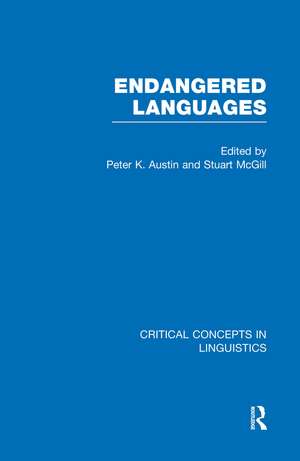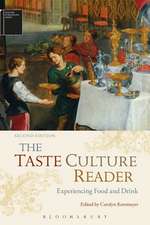Endangered Languages: Critical Concepts in Linguistics
Editat de Peter K. Austin, Stuart McGillen Limba Engleză Hardback – 9 aug 2011
The study of language endangerment has only really become a concern of mainstream linguistics in the past twenty years, and this four-volume collection is the first of its kind, bringing together research on language endangerment from leading scholars. Theoretical and practical responses by linguists have led to the emergence of the linguistic sub-fields of language documentation and language revitalisation, and most of the publications within them date from just the last ten years. There has however been a veritable flood of books and articles during this time, and an enormous flowering of interest both within academia and in the wider community as well. Twenty years ago an extensive collection on this topic could not have been put together.
A general introduction by the editors gives an overview of the history of research on endangered languages and the main issues faced by scholars of language endangerment today, while specific volume introductions detail the research context for the individual articles. Endangered Languages is an essential one-stop work of reference and will be appreciated by researchers and students of language endangerment and related disciplines.
Din seria Critical Concepts in Linguistics
- 34%
 Preț: 4369.55 lei
Preț: 4369.55 lei - 18%
 Preț: 1272.54 lei
Preț: 1272.54 lei - 34%
 Preț: 4805.70 lei
Preț: 4805.70 lei - 34%
 Preț: 6735.52 lei
Preț: 6735.52 lei - 34%
 Preț: 9833.67 lei
Preț: 9833.67 lei - 34%
 Preț: 7301.72 lei
Preț: 7301.72 lei - 14%
 Preț: 6742.03 lei
Preț: 6742.03 lei - 34%
 Preț: 9278.22 lei
Preț: 9278.22 lei - 34%
 Preț: 10679.71 lei
Preț: 10679.71 lei - 34%
 Preț: 7861.94 lei
Preț: 7861.94 lei - 34%
 Preț: 6742.44 lei
Preț: 6742.44 lei - 34%
 Preț: 7586.13 lei
Preț: 7586.13 lei - 34%
 Preț: 6700.27 lei
Preț: 6700.27 lei - 34%
 Preț: 6500.82 lei
Preț: 6500.82 lei - 34%
 Preț: 4373.63 lei
Preț: 4373.63 lei - 34%
 Preț: 6191.71 lei
Preț: 6191.71 lei - 34%
 Preț: 6136.37 lei
Preț: 6136.37 lei - 34%
 Preț: 6238.76 lei
Preț: 6238.76 lei - 34%
 Preț: 8986.73 lei
Preț: 8986.73 lei - 34%
 Preț: 6189.52 lei
Preț: 6189.52 lei - 34%
 Preț: 6209.19 lei
Preț: 6209.19 lei - 34%
 Preț: 4655.19 lei
Preț: 4655.19 lei - 34%
 Preț: 9272.88 lei
Preț: 9272.88 lei - 34%
 Preț: 6733.97 lei
Preț: 6733.97 lei - 36%
 Preț: 7584.39 lei
Preț: 7584.39 lei - 34%
 Preț: 6489.32 lei
Preț: 6489.32 lei - 34%
 Preț: 6741.19 lei
Preț: 6741.19 lei - 34%
 Preț: 5170.36 lei
Preț: 5170.36 lei - 34%
 Preț: 6739.17 lei
Preț: 6739.17 lei - 34%
 Preț: 5944.30 lei
Preț: 5944.30 lei - 34%
 Preț: 6735.10 lei
Preț: 6735.10 lei - 34%
 Preț: 4237.71 lei
Preț: 4237.71 lei - 34%
 Preț: 4941.28 lei
Preț: 4941.28 lei - 34%
 Preț: 6136.37 lei
Preț: 6136.37 lei - 34%
 Preț: 5619.64 lei
Preț: 5619.64 lei - 34%
 Preț: 6136.37 lei
Preț: 6136.37 lei - 34%
 Preț: 8993.29 lei
Preț: 8993.29 lei - 34%
 Preț: 4932.73 lei
Preț: 4932.73 lei - 34%
 Preț: 6145.14 lei
Preț: 6145.14 lei - 34%
 Preț: 7054.47 lei
Preț: 7054.47 lei - 34%
 Preț: 4378.10 lei
Preț: 4378.10 lei - 34%
 Preț: 5496.78 lei
Preț: 5496.78 lei - 18%
 Preț: 5920.08 lei
Preț: 5920.08 lei - 34%
 Preț: 4664.16 lei
Preț: 4664.16 lei - 34%
 Preț: 5936.34 lei
Preț: 5936.34 lei
Preț: 7302.73 lei
Preț vechi: 11062.67 lei
-34% Nou
Puncte Express: 10954
Preț estimativ în valută:
1397.40€ • 1461.96$ • 1160.81£
1397.40€ • 1461.96$ • 1160.81£
Carte tipărită la comandă
Livrare economică 02-16 aprilie
Preluare comenzi: 021 569.72.76
Specificații
ISBN-13: 9780415438438
ISBN-10: 0415438438
Pagini: 1792
Dimensiuni: 156 x 234 mm
Greutate: 3.4 kg
Ediția:1
Editura: Taylor & Francis
Colecția Routledge
Seria Critical Concepts in Linguistics
Locul publicării:Oxford, United Kingdom
ISBN-10: 0415438438
Pagini: 1792
Dimensiuni: 156 x 234 mm
Greutate: 3.4 kg
Ediția:1
Editura: Taylor & Francis
Colecția Routledge
Seria Critical Concepts in Linguistics
Locul publicării:Oxford, United Kingdom
Cuprins
VOLUME I: BEGINNINGS
Part 1: Language Obsolescence and Death
Part 2: Structural Changes
Part 3: Implications of Language Loss
Volume II: Language Documentation
Part 1: Defining Language Documentation
Part 2: Data in Language Documentation
Part 3: Documentation Methods
Volume III: Language Planning and Case Studies in Revitalization
Part 1: Language Planning Models
Part 2: Case Studies in Revitalization
Volume IV: Issues in revitalization and challenges for linguists
Part 1: General Issues in Revitalization
Part 2: Challenges for Linguists
Part 3: Endangered Languages in the Future
Part 1: Language Obsolescence and Death
Part 2: Structural Changes
Part 3: Implications of Language Loss
Volume II: Language Documentation
Part 1: Defining Language Documentation
Part 2: Data in Language Documentation
Part 3: Documentation Methods
Volume III: Language Planning and Case Studies in Revitalization
Part 1: Language Planning Models
Part 2: Case Studies in Revitalization
Volume IV: Issues in revitalization and challenges for linguists
Part 1: General Issues in Revitalization
Part 2: Challenges for Linguists
Part 3: Endangered Languages in the Future
Descriere
Most of the seven thousand or so languages spoken today are in danger of disappearing during the twenty-first century. Although languages have always come and gone, the current rate of language extinction is unprecedented, a loss which not only affects individual communities but also diminishes the world’s linguistic heritage. This crisis has stimulated a variety of responses from linguists: sociolinguists have been concerned with the study of language revitalization (how the tendency to shift away from minority languages can be reversed), while general linguists have paid more attention to the structural aspects of language endangerment (how languages change as they fall into disuse). In recent years, linguists have been particularly concerned with language documentation (the activity of capturing, annotating, and archiving audiovisual recordings of languages before they are lost). In addition, all linguists working on endangered languages face the ethical question of how much effort they should devote to non-academic activities in support of the communities with whom they work.
The study of language endangerment is a relatively new subfield within linguistics, and this four-volume collection is the first of its kind, bringing together research on language endangerment from the leading scholars of the last sixty years. A general introduction by the editors gives an overview of the main issues faced by scholars of language endangerment today, while specific volume introductions provide a research context for the individual pieces. Endangered Languages is an essential one-stop work of reference and will be appreciated by researchers and students of language endangerment and related disciplines.
The study of language endangerment is a relatively new subfield within linguistics, and this four-volume collection is the first of its kind, bringing together research on language endangerment from the leading scholars of the last sixty years. A general introduction by the editors gives an overview of the main issues faced by scholars of language endangerment today, while specific volume introductions provide a research context for the individual pieces. Endangered Languages is an essential one-stop work of reference and will be appreciated by researchers and students of language endangerment and related disciplines.








